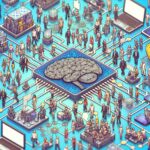As artificial intelligence continues to reshape the trading landscape, it has now taken an unprecedented role as an active participant in financial transactions. Rather than merely analyzing market data, AI agents are making real-time decisions, negotiating deals, and moving capital within decentralized financial systems, ushering in a new era for institutional cryptocurrency desks. This transformation promises not only faster trades and enhanced products but also introduces novel risks that traders must navigate.
One significant concern arises from the potential discrepancies between what different AI agents record during negotiations. For instance, if one agent books a derivatives contract for $100 million while another records it at $120 million, questions of accountability quickly surface. Such mismatches can lead to severe consequences, including payment failures and regulatory investigations.
“Even tiny mismatches create systemic risk.”
The agentic era highlights the fragility of current systems, especially when agents rely on unverifiable data. Reports have shown that AI applications, even in critical sectors like healthcare, can falter—such as when an AI system misdiagnosed a patient by referencing fictitious sources. To mitigate these risks, a robust framework is essential, laying the groundwork for trust and accountability in AI operations.
The solution involves a tripartite foundation: decentralized infrastructure to enhance system resilience, a trust layer to ensure verifiable and consensual transactions, and reliable AI agents that maintain provenance and accountability. This approach can empower agents to operate effectively within shared environments while minimizing the risk of operational failures.
Ultimately, to thrive in this evolving landscape, industries must prioritize transparency and resilience. Open-source networks are positioned to become essential components in building trusted AI frameworks, paving the way for a future where AI not only automates processes but does so in a trusted and accountable manner.

AI on the Trading Floor: The Emergence of Intelligent Agents
Key points from the article include:
- AI as Active Participants: AI is not just analyzing markets, but also negotiating deals and moving capital.
- Accountability Challenges: Differing recorded amounts between agents can trigger failures and investigations.
- Systemic Risks: Small discrepancies can lead to significant financial and reputational damage in the trading system.
- Necessity for Verifiability: Even advanced AI systems must rely on verifiable and accountable data to operate effectively.
- Need for a Trusted Network: Just as the web required HTTPS, the rise of AI agents necessitates a trusted network to prevent divergence and ensure reliability.
- Decentralized Infrastructure: A decentralized system eliminates single points of control, promoting resilience and sustainability.
- Core Layers of Operation:
- Trust Layer: Ensures verifiability and consensus at the protocol level.
- Reliable AI Agents: Enforces accountability and auditability for transparent transactions.
- Operating Environment Requirements:
- Consensus: Agreement on occurrences within the system.
- Provenance: Identification of decision influences and approvals.
- Auditability: Ease of tracking and tracing every transaction step.
- Importance of Open Source Networks: Policymakers and enterprises should support open networks as the backbone for trusted AI operations.
The article highlights the necessity for a trusted infrastructure and the inherent risks associated with unverified data in the evolving domain of AI-driven financial transactions.
The Rise of AI Agents in Trading: Opportunities and Challenges
The integration of AI into trading environments marks a significant shift in how financial transactions are executed. Unlike traditional software, these AI agents actively engage in negotiations, shaping market dynamics directly. This innovative approach facilitates quicker trades, enhanced product offerings, and exposure to novel financial opportunities. However, the dual-edged sword of rapid advancement brings challenges, particularly regarding data integrity and accountability.
Competitive Advantages: The ability of AI agents to negotiate contracts autonomously offers substantial efficiency gains. Institutions harnessing these technologies could see a drastic reduction in transaction times, enabling them to respond quicker to market movements. Furthermore, the potential for decentralized infrastructure heralds a new era of resilience, eliminating dependencies on centralized entities. This framework positions forward-thinking firms at the forefront of innovation, setting them apart in a competitive landscape.
Competitive Disadvantages: On the flip side, the reliance on AI agents raises significant concerns about data accuracy and accountability. Instances reported—such as the UK healthcare AI misdiagnosis—illustrate the pitfalls of erroneous data feeding into critical systems. In finance, discrepancies in recorded values, like the hypothetical $20 million gap in derivatives contracts, create risks that could spiral into regulatory scrutiny or damage to reputation. This unpredictability highlights a pressing need for robust mechanisms that ensure datasets are verifiable and trustworthy.
The adoption of AI trading agents could greatly benefit institutional investors seeking agility in a fast-paced market, minimizing human error and maximizing operational efficiency. Conversely, firms falling behind in implementing secure, transparent systems may find themselves vulnerable to setbacks not just financially but also reputationally. As the landscape continues to evolve, the imperative for shared accountability and reliable infrastructure will define the success or failure of organizations traversing this new agentic era.














